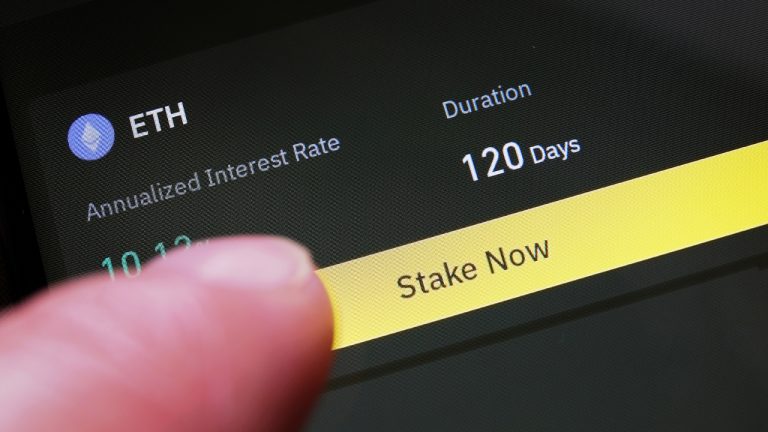Distributed Validator Technology More Primed to Overcome the Ethereum Validator Overload Challenge – Alon Muroch

While the Ethereum network’s migration to a proof of stake (PoS) consensus mechanism has seen the protocol become less energy-intensive, Alon Muroch, the founder of the SSV Network core team, said if the number of validators is not contained this can lead to a network overload.
The Promise Offered by Distributed Validator Technology
Muroch said many stakeholders including Ethereum co-founder Vitalik Buterin are already working on potential solutions which can stop the network from becoming overloaded. As the data from Staking Rewards has shown, the Ethereum network is on course to see a 100% staking of ether by December 2024. If this happens, the network runs the risk of not having any ETH left for transaction purposes, the founder of the SSV Network core team argued.
While the idea of capping the number of validators is seen as a more practical solution, Muroch said he believes Distributed Validator Technology (DVT) to be the ideal solution to the problem. He argued that besides helping to remove single points of failure, DVT increases client diversity and overall reduces systemic risk.
In his written answers sent to Bitcoin.com News, Muroch urged the staking community to make DVT the “gold standard” for staking infrastructure.” When this is widely adopted, DVT not only helps to reduce the systemic risk on Ethereum but also enables more robust staking services. Below are Muroch’s answers to all the questions sent.
Bitcoin.com News (BCN): According to Staking Rewards, there are more than 894,000 validators on the Ethereum network, and the number is expected to go up soon. Though it helps with decentralization, do you believe that the sheer number of validator nodes puts great strain on the network?
Alon Muroch (AM): The growing number of validators on the Ethereum network is a concern that’s being actively discussed amongst core devs/communities and projects like SSV Network. In a recent discussion thread, Vitalik [Buterin] addressed some ways to mitigate this issue, one of the solutions is to use DVT.
DVT can enable “grouping” many validators under a single cluster, in a distributed way, reducing the load on the beacon chain.
BCN: Validator weaknesses, especially the key management and downtime risks, are not fully understood by the ETH community. Can you share a few details of what you with our readers?
AM: Running validators at scale is a complicated task, especially in a competitive market like ethereum. In recent weeks, several compromised operators and client developers affected Ethereum’s performance, which could have been avoided with a fault-tolerant protocol like DVT.
BCN: What is Distributed Validator Technology and how does it work?
AM: Distributed-Validator-Tech (DVT) is a protocol that enables the distributed operations of an ethereum validator between independent operators. SSV built a whole DVT network which enables anyone to run a distributed validator in seconds, and for developers to build entire applications.
DVT was initially designed, by the Ethereum Foundation, as a way to distribute ethereum and make it more robust. It helps with removing single points of failure, increasing client diversity and overall reducing systemic risk.
DVT uses a consensus protocol and threshold signatures as its core components (alongside P2P publish/subscribe networking). No single operator within a DVT cluster can compromise the validator.
BCN: With the growing number of Ethereum validators, how does SSV Network’s ETH staking infrastructure ensure seamless utilization of DVT at scale?
AM: DVT at scale is a hard challenge that we’ve been working on for 3 years. It requires a lot of design work, optimization and developer tooling. SSV is built as a network so every tool/ optimization/ research can easily propagate to the entire network.
SSV Just launched to fully permissionless mainnet and already manages 70K ETH stake with better than benchmark performance. We expect the DVT market share to be 10-20X what it is today.
BCN: Just like other protocols, your network claims to be an open-source, decentralized, and permissionless network. While a decentralized platform is always better for Web3, you are also aware that a lot of the decentralized projects have an element of centralization at their core. How do you assure developers and stakers that SSV Network is what you say it is?
AM: From inception, SSV set as a goal the independence of its DAO. That means the DAO has an independent ability to control and progress the protocol. Regardless of any specific team/ person.
To that end, grants are granted to different teams to develop different components of the protocol. The DAO controls the protocol contracts and any updates to them. All of that means that token holders vote to decide how SSV will look in the future.
BCN: Given the benefits of DVT, in your view, what initiatives should the staking industry take or encourage to make DVT as accessible and easy to use as possible for developers?
AM: I believe the staking community needs to adopt DVT as the gold standard for staking infrastructure and make sure we move from a single point of failure setup (the current tech stack most use) to a distributed validator future.
It will reduce the systemic risk on Ethereum and make better and more robust staking services. DVT is to staking what L2s are for transaction processing, a decentralized alternative, which is superior.
What are your thoughts about this interview? Let us know what you think in the comments section below.
from Bitcoin News https://ift.tt/apOkMsf
Comments
Post a Comment